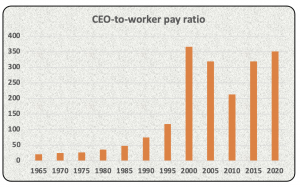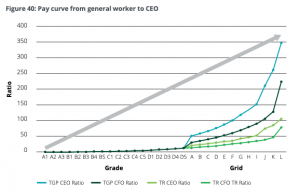When the Johannesburg Stock Exchange (JSE) introduced the requirement for listed companies to disclose the remuneration of executive directors in the early 2000s, I was on record warning about the unintended consequences of this. I argued that by making executive pay public knowledge, the average remuneration of directors would generally rise as individuals demanded comparative pay to their peers. Previously, executive remuneration was not in the public domain and hence, it was difficult for executives to benchmark executive pay except anecdotally.
The Companies Amendment Bill of 2021 in South Africa proposes taking disclosure of executive remuneration a step further. It proposes the disclosure by state-owned and public companies of:
- the total remuneration (guaranteed salary, benefits and other incentives) that has been paid to the highest paid employee and that of the lowest paid employee
- the average and median remuneration of all employees
- the gap, expressed as a ratio, between the top 5% highest paid employees and the bottom 5% lowest paid workers
The U.S. Securities and Exchange Commission (SEC) introduced similar disclosure requirements in 2015 for all listed USA companies. Their requirements are simpler requiring only the disclosure of what the CEO earns versus the median (mid-point in the data set) of all its employees except the CEO. The Marxist leanings of the ANC government is clearly evident in the Companies Amendment Bill 2021, requiring public and state-owned companies to publish what the highest and lowest paid employees earn, which will reveal a much worse pay gap than comparing the CEO’s paycheck to the median salary of all employees. I also venture to guess that the pay gap ratio at our bloated state-owned entities will be much lower than in the private sector.
The Economic Policy Institute based in Washington D.C, recently published the CEO-to-worker compensation ratio (average remuneration of CEO versus the average worker in that firm’s industry). According to their calculations, CEOs earned 351 times more than the average pay packet of all employees. This ratio reached a peak in 2000 during the dot.com boom but 2020’s result, whilst in the midst of a pandemic, is near that peak.

As can be seen in the above chart, the CEO-to-worker pay ratio was ±20 times in 1965. It has increased steadily over time, which may be due to lucrative share incentive schemes which enrich the top executives rather than the masses.
McDonald’s CEO, Chris Kempczinski, earned a total of US$10.8 million in 2020 which was 1,189 times higher than the median salary (US$9,122) of McDonald’s employees. The pay ratio is calculated as CEO remuneration divided by the global median salary of McDonald’s workers. I would be guessing that a griller in Phuket, Thailand would not be earning the same as his/her counterpart in New York.
Deloitte in its September 2021 report, “Your guide: Director and prescribed officer remuneration at JSE listed companies”, reveals that the total guaranteed pay (TGP) of CEOs versus the general worker of JSE listed companies is similar to the USA experience. Magically, the ratio of 350 times in RSA is near damn it to the USA’s 351 times.

PS. Andre de Ruyter, the CEO of Eskom, earned R7.2 million in the year ended 31 March 2021, which was 9.5 times that of the average of all Eskom employees (±R748,626).
The Economic Policy Institute estimated that the average realized remuneration of CEOs of USA listed companies was US$24.2 million in 2020. That would imply that the average worker pay was ±US$69,000 in 2020. This is similar to the US Census Bureau’s published data of median household income of US68,703 in 2019. I have some sympathy for those who argue that executive compensation is generally too high relative to their actual inputs and versus the general worker. Imagine earning US$24.2 million a year (±R363 million) for barking orders and traveling business class and occasionally having to explain things at a board meeting?
PWC’s “Practices and remuneration trends report, August 2021”, reveals that the average pay packet of CEOs of JSE listed companies was R5.2 million in 2020 whilst the average CEO pay in the larger listed consumer goods companies was a whopping R38.7 million. It would appear that South African executives are significantly underpaid relative to their USA peers (dry humor intended, no offense meant).
I wonder what the intentions are behind forcing the disclosure of the highest paid employee versus the lowest paid, and the pay gap between the top 5% and bottom 5%? Well, the Companies Amendment Act Bill published on 1 October 2021, had some interesting statements in this regard:
“…Excessive remuneration particularly at the highest levels of a company is a matter of great concern internationally…”
“…The factors giving rise to these concerns are to an extent responsible for the significant levels of inequity in society…”
“…The amendments proposed in the Bill are also required to tackle the injustice of excessive pay. The pay gap has been a historical challenge and a contributor to the country’s inequality…”
“…Analysis of Statistics South Africa data in the annual Labour Market Dynamics survey shows that inequality in pay contributes as much to overall income inequality as joblessness…”
“…This kind of inequality underpins much of the well-known workplace conflict in South Africa…”
Ok, I get it. The reason for inequality and inequity in society is that executives are paid so much more than lowly workers. Our Minister of Trade, Industry and Competition, the notorious communist Ebrahim Patel, seems to think that the answer to South Africa’s dire unemployment and inequality problems are to simply force those capitalist pigs to disclose what they earn. Perhaps a better way of reducing income inequality would be to pay all workers the same irrespective of education, skill, know-how and experience levels? That would certainly solve the inequality problem. Furthermore, perhaps nationalizing everything would solve wealth inequality too since all of us except those communists at the top would have no assets. I am being facetious. There are some very clever economists and business people out there who could provide some solid suggestions to reducing unemployment and inequality. I don’t trust these ANC cadres and their advisors to solve anything. Rather I expect them to blame everyone else for destroying the South African economy and creating world leading unemployment levels.
If these disclosure rules are enforced, what do I think may transpire?
- Public companies will continue to pay their executives millions, ignoring the bleating regulators;
- Companies will find ingenious ways to hide elements of executive compensation;
- Companies may embark on African and international expansion, limiting investment in South African operations;
- The trade unions will demand higher wages for their members by highlighting the enormous pay gaps;
- Companies may aggressively replace lower skilled and paid employees with robots and automation;
- Companies may outsource more of their operations; and/or
- Rising unemployment levels in South Africa.
Beware the unintended consequences of decisions
Have fun out there and celebrate the municipal election results. Service delivery is set to improve in certain areas. All the best from BeechieB.

Recent Comments